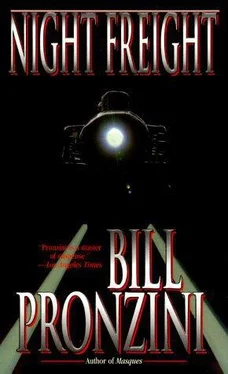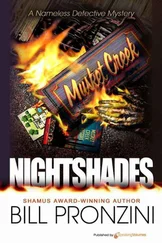Bill Pronzini - Night Freight
Здесь есть возможность читать онлайн «Bill Pronzini - Night Freight» весь текст электронной книги совершенно бесплатно (целиком полную версию без сокращений). В некоторых случаях можно слушать аудио, скачать через торрент в формате fb2 и присутствует краткое содержание. Год выпуска: 2000, ISBN: 2000, Издательство: Leisure Books, Жанр: Ужасы и Мистика, на английском языке. Описание произведения, (предисловие) а так же отзывы посетителей доступны на портале библиотеки ЛибКат.
- Название:Night Freight
- Автор:
- Издательство:Leisure Books
- Жанр:
- Год:2000
- ISBN:0843947063 (isbn13: 9780843947069)
- Рейтинг книги:5 / 5. Голосов: 1
-
Избранное:Добавить в избранное
- Отзывы:
-
Ваша оценка:
- 100
- 1
- 2
- 3
- 4
- 5
Night Freight: краткое содержание, описание и аннотация
Предлагаем к чтению аннотацию, описание, краткое содержание или предисловие (зависит от того, что написал сам автор книги «Night Freight»). Если вы не нашли необходимую информацию о книге — напишите в комментариях, мы постараемся отыскать её.
Night Freight — читать онлайн бесплатно полную книгу (весь текст) целиком
Ниже представлен текст книги, разбитый по страницам. Система сохранения места последней прочитанной страницы, позволяет с удобством читать онлайн бесплатно книгу «Night Freight», без необходимости каждый раз заново искать на чём Вы остановились. Поставьте закладку, и сможете в любой момент перейти на страницу, на которой закончили чтение.
Интервал:
Закладка:
So little left, she thought as she turned from the window. John gone these many years. Moira gone—no family left at all. Lord Byron gone six months, and as much as she missed the little Sealyham's companionship, she hadn't the heart to replace him with another pet. Gone, too, were most of her friends. And the pleasures of teaching grammar and classic English literature, the satisfaction that came from helping to shape young minds. ("We're sorry, Mrs. Halliday, but you know the mandatory retirement age in our district is sixty-five.") For a time there had been a few students to privately tutor, but none had come since last spring. County library cutbacks had ended her volunteer work at the local branch. The arthritis made it all but impossible for her to continue her sewing projects for homeless children. Even Mrs. Boyer in the next block had found someone younger and stronger to babysit her two preschoolers.
The loneliness had been endurable when she was needed, really needed. Being able to help others had given some meaning and purpose to her life. Now, though, she had become the needy one, requiring help with the cleaning, the yardwork, her weekly grocery shopping. All too soon, she would no longer be able to drive her car, and then she would be housebound, totally dependent on others. If that happened...
No , she thought , it mustn't. I'm sorry, John, but it mustn't .
She thought again of the old barn, his workshop, the long, high rafter beam. When it had become clear and irrefutable what she must one day do, there had never been any question as to the method. Mr. Gilbert Chesterton had seen to that. She had bought the rope that very day, and it was still out there waiting. She would have to stand on a ladder in order to loop it around the beam—not an easy task, even though the knot had long ago been tied. But she would manage. She had always managed, hadn't she? Supremely capable, John had called her. That, and the most determined woman he had ever known; once her mind was made up, nothing would change it. Yes, and the end would be quick and she would not suffer. No one should ever have to suffer when the time came.
Chesterton's lines ran through her mind again:
The strangest whim has seized me.
. . . After all
I think I will not hang myself today.
She had first come across "A Ballade of Suicide," one of his minor works, when she was a girl, and there had been something so haunting in those three lines that she had never forgotten them. One day, she would alter the last of the lines by deleting the word "not." This day, perhaps...
Miranda bathed and dressed and brushed her hair, which she kept short and wavy in the fashion John had liked. Satisfied with her appearance, she made her way downstairs and fixed a somewhat larger breakfast than usual—a soft-boiled egg to go with her habitual tea and toast. Then she washed the dishes—her hands were not paining too badly this morning—and entered the living room.
John had built every stick of furniture in there, of cherry wood and walnut. Tables, chairs, sofa and loveseat, sideboard, the tall cabinet that contained his collection of rifles and handguns. (She hated guns, but she had been unable to bring herself to rid the house of anything that had belonged to him.) Handcrafted furniture had been both his vocation and his hobby. An artist with wood, John Halliday. Everyone said so. She had loved to watch him work, to help him in his shop and to learn from him some of the finer points of his craft.
The photograph of John in his Navy uniform was centered on the fireplace mantel. She picked it up, looked at it until his lean, dark face began to blur, then replaced it. She dried her eyes and peered at the other framed photos that flanked his.
Mother, so slender and fragile, the black velvet-banded cameo she'd always worn hiding the grease burn on her throat. Father in cap and gown at one of his college graduation ceremonies, looking as young as one of his students. Moira and herself at ages four and seven, all dressed up for some occasion or other, and wasn't it odd how much prettier she had been as a child, when it was Moira who had grown into such a beautiful woman? Uncle Leon, his mouth full of the foul pipe he favored, and Aunt Gwen as round and white as the Pillsbury Doughboy. Gone, all gone. Dust. Sweet-sad memories and scattered specks of dust.
Miranda moved to the bookcases on the near side of the fireplace. Her domain; John had never been much of a reader, despite her best efforts. Plato, Thomas Aquinas, Shakespeare, Chaucer. Scott, Dickens, Hawthorne, the Brontë sisters, Stevenson. Browning and Byron and Eliot and Edna St. Vincent Millay. Nearly a dozen volumes of fiction and nonfiction by Chesterton, always her favorite. Oscar Wilde, so amusing and ironic—
The phone was ringing.
She may have heard the first ring, or the bell may have sounded two or three times before she grew aware of it; she wasn't quite sure. She went to answer it.
"Miranda, dear, how are you?"
"Oh, hello, Patrice."
"You sound a bit melancholy this morning. Is everything all right?"
"Yes. You mustn't worry about me."
"But I do. You know I do."
Miranda knew it all too well. Patrice was one of her oldest friends, but their closeness was neither deep nor confiding. Patrice's life had been one long, smooth sail, empty of tragedy of any kind; she had never needed anyone outside her immediate family. And ever since Miranda's own tragic loss, Patrice's friendship and concern had been tinged with thinly concealed pity.
"I called to invite you to lunch tomorrow," Patrice said. "You need to get out more, and lunch at the Shady Grove Inn is just the ticket. My treat."
"That's good of you, but I don't believe I'll be able to accept."
"Other plans, dear?"
"I . . . may not be here tomorrow."
"Oh? Going away somewhere?"
"Possibly. It's not quite certain yet."
"May I ask where and with whom?"
"I'd rather not say."
"Of course, I understand. But talking about something in advance really doesn't prevent it from happening, you know."
"It can," Miranda said. "Sometimes it can."
"Well, you must tell me all about it afterward."
"It won't be a secret, Patrice. I can promise you that."
They talked a few minutes longer. Or rather, Patrice talked, mostly about her grandchildren. Miranda only half listened. It seemed quite cold in the house now, despite the fact that she had turned up the heat when she came downstairs. Imagination? No, she could hear the wind in the eaves, gusting more strongly than before, and when that happened the house always felt drafty.
When Patrice finally said goodbye, Miranda returned to the living room and put on the gas-log flame in the fireplace. She sat in front of it with a copy of Wilde's The Importance of Being Earnest open on her lap and tried to read. She couldn't seem to concentrate. I wish I had something else to do, she thought, something useful or important.
Well , she thought then, there is something, isn't there? Out in the barn?
But she was not ready to go out there yet. Not just yet. She picked up Wilde and tried again to focus on his words.
She was dozing when the doorbell rang. Dreaming about something pleasant, something to do with John and their honeymoon in the Caribbean, but the jarring sound of the bell drove it away. A visitor? She so seldom had visitors these days. The prospect hurried her steps to the door.
But it wasn't a visitor; it was Dwayne, the mailman, on the porch outside. "Morning, Miz Halliday," he said. "More mail than usual today so I thought I'd bring it up, save you the trouble."
"That was good of you, Dwayne."
"Catalogues, mostly. Not even the end of October and already we got piles of Christmas catalogues. Seems like they start sending 'em out earlier every year."
Читать дальшеИнтервал:
Закладка:
Похожие книги на «Night Freight»
Представляем Вашему вниманию похожие книги на «Night Freight» списком для выбора. Мы отобрали схожую по названию и смыслу литературу в надежде предоставить читателям больше вариантов отыскать новые, интересные, ещё непрочитанные произведения.
Обсуждение, отзывы о книге «Night Freight» и просто собственные мнения читателей. Оставьте ваши комментарии, напишите, что Вы думаете о произведении, его смысле или главных героях. Укажите что конкретно понравилось, а что нет, и почему Вы так считаете.












